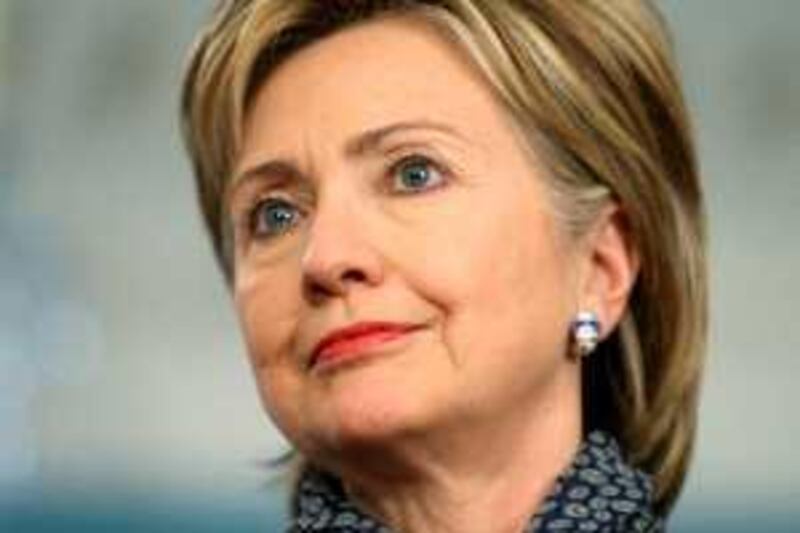RAMALLAH // She is coming, she said, to collect thoughts on how best to move forward on seeking peace and security in the region. But Hillary Clinton, in her first visit as US secretary of state, is unlikely to be much wiser by the time she leaves for Europe on Wednesday. There is still no government in Israel, where Benjamin Netanyahu, who has been asked to form a coalition government, looks likely to include a number of far-right parties, lukewarm at best on peace negotiations with the Palestinians.
Having been rebuffed by Tzipi Livni, the Israeli foreign minister and head of Kadima, Israel's largest party, Mr Netanyahu could find himself having to balance the demands of far-right coalition partners with pressure from Washington. Mr Netanyahu himself has never fully embraced the two-state solution toward which Mrs Clinton has said Washington has a "strong commitment". Mrs Clinton, in a recent interview with Voice of America, also said the US administration would work toward the creation of a viable, independent Palestinian state in the West Bank and Gaza, putting Washington immediately at odds with Mr Netanyahu, who at best talks of Palestinian "self-rule".
A similar dynamic exists on the Palestinian side, where unity talks have just got under way in Cairo. The outcome of those talks, which seek to reconcile the estranged Fatah and Hamas factions, will to a large extent determine US relations with the Palestinians. Mrs Clinton has said that unless Hamas accedes to international conditions to renounce armed resistance, recognise Israel and abide by previous PLO commitments, a unified Palestinian Authority will not necessarily be a positive step. Hamas continues to refuse those demands, saying that similar conditions - ending the occupation, recognising a Palestinian state and abiding by previously signed agreements - should apply to Israel.
Moreover, politically strengthened after Israel's recent offensive, Hamas can drive a hard bargain with Mahmoud Abbas, the Palestinian president whom Washington will talk to and whose domestic standing suffered as a result of the Israeli offensive. An inflexible US position on a unity government could put Mr Abbas in an unworkable position between domestic and foreign pressures. The one tangible result that may come of her visit is movement on reconstruction efforts in Gaza. Mrs Clinton is due in Sharm El Sheikh, Egypt, tomorrow to take part in a regional conference on rebuilding Gaza after Israel's devastating three-week offensive. Palestinians estimate the cost of reconstruction there at US$2.8 billion (Dh10.3bn). The US is expected to pledge $900 million.
But any movement on that front will hinge on progress in the Egyptian-mediated ceasefire negotiations between Hamas and Israel. These are currently bogged down over a prisoner exchange for Sgt Gilad Shalit, an Israeli soldier captured in 2005, as well as domestic Israeli wrangling after Amos Gilad, the senior Israeli negotiator in those talks, fell out with Ehud Olmert, the outgoing prime minister.
Low-level violence, meanwhile, continues in and around the Gaza Strip. Yesterday, at least one rocket was fired across the border from Gaza, while Israel has continued to launch air strikes at smuggling tunnels under the Gaza-Egypt border. Mrs Clinton and the representatives of the dozen or so countries who will meet in Sharm El Sheikh tomorrow will be unable to make much headway in efforts to rebuild Gaza for as long as no formal or semi-formal ceasefire agreement is in place.
Barack Obama, the US president, has said he would "hit the ground running" in pushing Palestinians and Israelis toward a comprehensive agreement. But doubts remain over how much effort the US can exert for Palestinian-Israeli peace amid several other priorities for Washington, including the global financial crisis, Iran, Iraq and Afghanistan. Mrs Clinton's visit, shortly after the second visit of George Mitchell, Washington's Middle East envoy, is partly meant to underline America's commitment to press diplomatic efforts.
But it comes at a time of little clear leadership and no diplomatic movement on either the Palestinian and Israeli sides, both of whom will be looking to the US for direction. If Mrs Clinton is here to look for ideas, she will find she is not the only one. okarmi@thenational.ae





